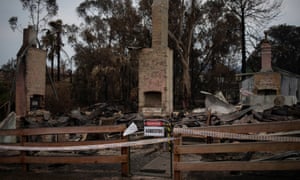The charity says $1,000 cash payments to survivors are too small and should be raised to $3,000
The St Vincent de Paul Society says the cash grants made available to
bushfire survivors were too small, not flexible enough, and took too
long to approve.
In a submission to the royal commission into national natural disaster arrangements, the charity said the structures in place for delivering emergency aid were too restrictive and led to delays in cash being made available, which caused “reputational damage” to both charities delivering the funds and the federal government itself.
“During the bushfires, the amount of time taken to process payments led to public criticism of charities, including by government officials,” the St Vincent de Paul chief executive, Toby O’Connor, wrote.
“This reputational damage not only impacted on the flow of donations, it made operational circumstances difficult for our volunteers, at a time when they needed support … At a time when the society needed to direct all of its resources to responding to need, its efforts were instead diverted to managing and responding to criticisms.”
The royal commission will begin public hearings on 25 May and is due to make recommendations in August. It has narrowed its focus to national coordination arrangements and mitigation methods. A group of ex-fire chiefs said it should recommend Australia develop “fast attack strategies” to prevent megafires from forming.In a submission to the royal commission into national natural disaster arrangements, the charity said the structures in place for delivering emergency aid were too restrictive and led to delays in cash being made available, which caused “reputational damage” to both charities delivering the funds and the federal government itself.
“During the bushfires, the amount of time taken to process payments led to public criticism of charities, including by government officials,” the St Vincent de Paul chief executive, Toby O’Connor, wrote.
“This reputational damage not only impacted on the flow of donations, it made operational circumstances difficult for our volunteers, at a time when they needed support … At a time when the society needed to direct all of its resources to responding to need, its efforts were instead diverted to managing and responding to criticisms.”
It also received $11m in commonwealth emergency relief funding, to be delivered as $1,000 cash payments, about 40% of which has been expended.
Vinnies said the decision to limit grants of emergency relief funding to charities that already had commonwealth grant agreements in place meant that local charities and not-for-profits were excluded, and recommended the Public Governance, Performance and Accountability Act 2013 be amended to provide a more “flexible” approach.
It also said the $1,000 payments were too small and the criteria for granting them too restrictive, and recommended the grants be increased to $3,000 and the government adopt a “flexible, client-centred approach”. Vinnies provided $3,000 grants under its own emergency relief fund.
Under the criteria in place this summer, the $1,000 grants were only available to people who were at “imminent risk of not being able to pay their bills”, which O’Connor said “caused a lot of angst”.
“Many people were reluctant to agree to this for many reasons including personal pride, even if they had been heavily impacted by the fires,” he said.
Others did not qualify because they lived off-grid and needed to buy new water tanks and emergency generators, rather than help paying a utility bill. “Not only was the Commonwealth $1,000 cash payment inadequate, it could not be used for this purpose,” O’Conner said.
The submission recommended cash payments be delivered by the federal government through Services Australia, to ensure money is delivered immediately.
It also said mobile commonwealth services in bushfire areas needed to stay open after 4pm, so people who were using the daylight hours to repair their properties could still seek assistance.
O’Connor said some towns, such as Cobargo on the NSW south coast, had “limited service provision” and others, such as the Victorian towns of Mallacoota and Corryong, were cut off for weeks due to road closures, preventing support services from getting through.
He said a lack of access to local government area data made it difficult for charities to coordinate a local response, adding that it took the NSW government “a considerable amount of time” to release information such as how many houses had been destroyed.
The charity also criticised the federal government for not really developing a national response to the bushfires until early January, when Victoria and NSW were burning.
“It should not require a disaster to occur across multiple jurisdictions before a full service response and payments are developed and implemented,” O’Connor said.

No comments:
Post a Comment